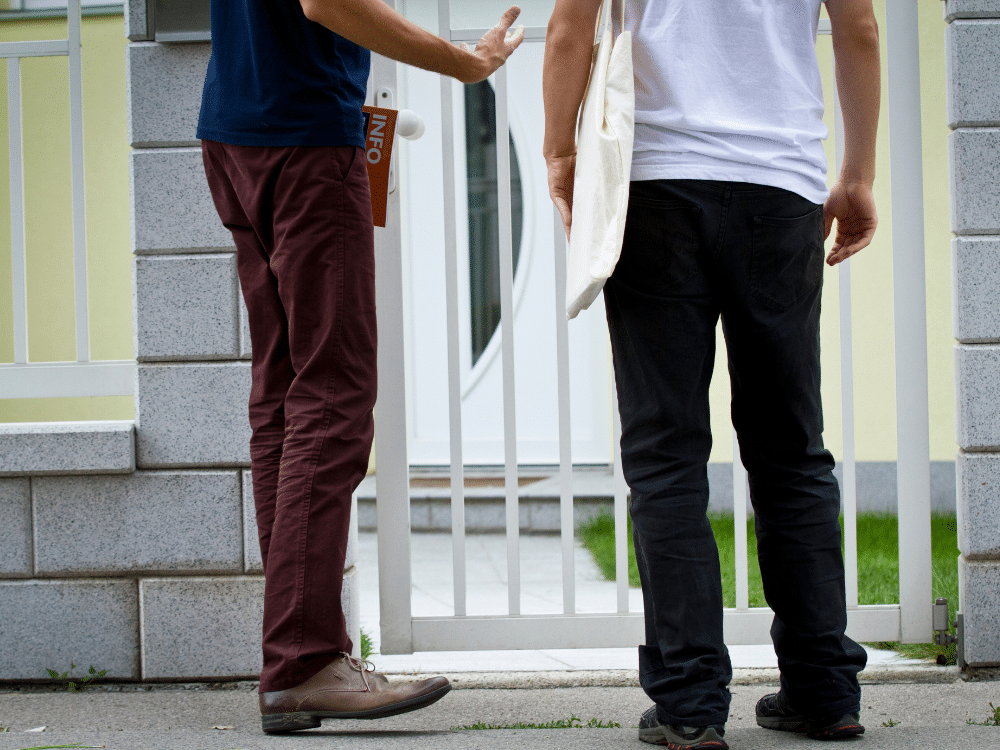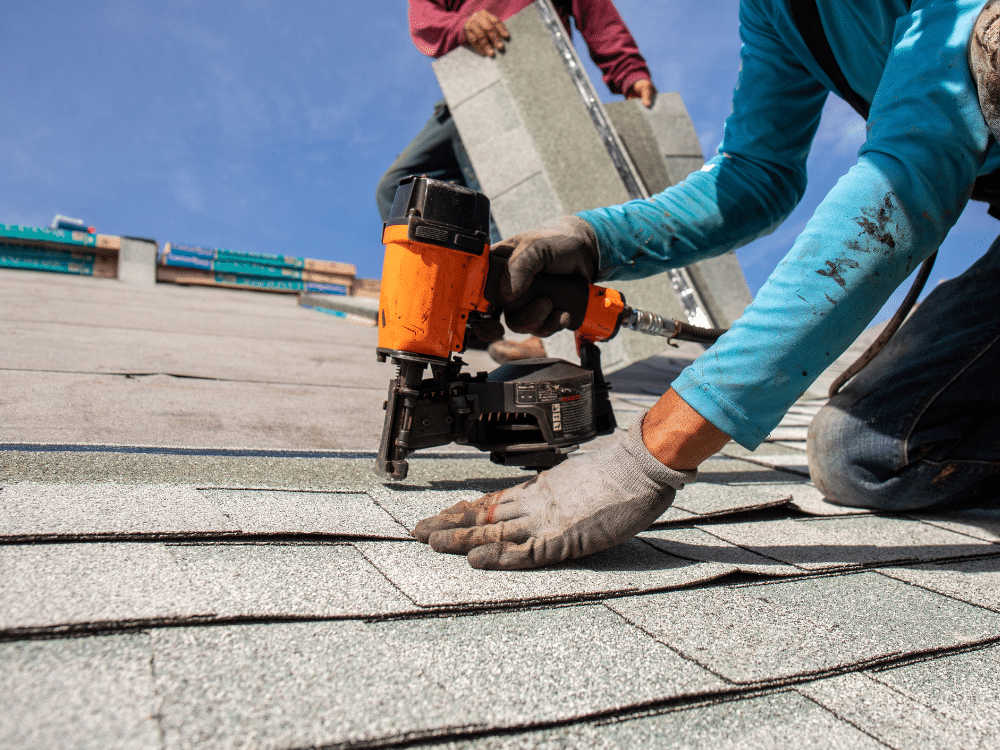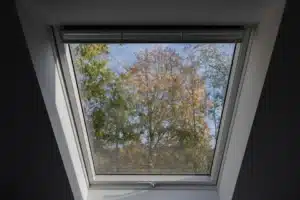
With every storm season in Raleigh, NC comes an army of roofers canvassing the neighborhoods. There are yard signs galore and construction projects daily. Before signing with the first roofing contractor available, we strongly recommend you do your research. Otherwise, you might just find yourself working with a storm chaser.
Your roof is one of the largest investments you will make on your home. Whether it’s an insurance job or you’re paying out of pocket, you’ll want to make sure you get the best workmanship possible from a local roofing company. Otherwise, you may pay the cost later.
Unfortunately, much of our business is fixing poor roofing jobs other companies did. The work was done so poorly that the homeowners experience roofing issues just a few years after installation. Not only that, but their roofer also uses a warranty loophole to get out of the work or has gone back to their home state.
These roofers try to scare homeowners into thinking they need to replace their roofs and file a claim right after the storm. Their goal is to get as many jobs as possible only to subcontract out the work and then go back home.
We call them storm chasers.
In this post, we’ll teach you how to spot a storm chaser and what to look out for when picking a contractor.
What Are Storm Chasers?
Storm chasers are a type of roofing salespeople. They go state to state “chasing” after big storms. These salespeople find the neighborhoods that were hit hardest and go door-to-door offering free inspections. They almost always tell you to file a claim and pressure you to do it on the spot.
They do not have a home office in the area. Usually, they haven’t been in business very long and do not have a solid team of roofers. Instead, they utilize subcontractors who may not even be certified or skilled in roofing.
The result? Poorly installed roofs that don’t last long and develop issues within a few years of installation. When those problems do come, the roofing company is no longer there to help.
That’s why, even when it’s an insurance job, you want to make sure you pick the right roofer. Otherwise, you could be paying for the contractor’s mistakes out-of-pocket.
So, how do you spot these storm chasers?
How to Spot a Storm Chaser

1. They go door to door uninvited.
They don’t have enough business otherwise, and they don’t have a strong enough reputation to let the homeowners approach them.
2. They have a “lifetime” workmanship warranty.
When they say they have a lifetime workmanship warranty, that is a huge red flag. No business can promise that, because no business can guarantee they will be around that long.
3. They make you sign something before going on the roof.
Be very wary of what you sign. If a roofer asks you to sign something before they go on your roof, it could secretly be an agreement to use them as your roofer, and then you’re stuck.
4. They push you to file a claim right away.
You always have time to do your research. Even if your roof is leaking, there are ways to temporarily fix leaks so you can take your time to weigh your options. Storm chasers are not around for very long, so they will push you to decide right away so they can get the job and go.
5. Their crew does not have any company gear.
When a crew doesn’t match the company, chances are they are subcontractors.
6. Their license plate is from another state.
If your roofer has a license plate from another state, it’s a tell-tale sign they are not local.
7. They won’t provide you a quote without seeing the insurance paperwork.
Many storm chasers insist on seeing your insurance paperwork. Yes, insurance paperwork is incredibly helpful for a roofer. It has all your roof measurements, making it easier and faster to put together a quote. We sometimes ask for it too, but we never require it. Storm chasers require your insurance paperwork so they can match their quote to it to maximize their profits–even if their job doesn’t actually cost that much.
8. They offer to “pay” your deductible.
Number one, this is illegal. Number two, they probably will just add the cost of your deductible to the roofing quote to make up for it.
Each of these clues should act as a “stop” sign for you. If you notice any of these things, you’ll want to pause and do some research before moving forward with that contractor.
7 Things to Verify When Picking a Roofing Contractor

Do not just ask. Verify. A business can tell you they are local and have been in business for a long time, but can they prove it? Local could mean the other side of the state. “A long time” could be six months. Ask for proof and backing on their claims. Visit the Better Business Bureau or Secretary of State website to verify their location and how long they have been in business.
Below are seven things to verify when choosing a roof contractor.
1. How long has the roofing contractor been in business?
Even if a roofer’s warranty policy looks great, it won’t matter if they have only been in business for six months. You want to find a roofer who is established enough that they will be around to uphold the warranty they promise you.
2. Where are they located?
Most storm chasers come from other states. Consequently, if something goes wrong with your roof after installation, they won’t be around to fix it. With a local roofing company, you know they will physically be there to help if anything goes wrong down the line.
3. Does the roofing contractor utilize any subcontractors?
Subcontracting is not evil, but it’s not great either. A business is only as good as its workers. If your roofer uses whatever crew they can find, how can they guarantee quality work? Their work is inconsistent, and the crew often is untrained in proper installation procedures.
4. Who is certified in the roofing process?
Shingle brands offer certifications to contractors so that homeowners can guarantee that the roofers know what they are doing. Unfortunately, for many roofing companies, only the owner gets certified, not the crew. Subsequently, a company may say they are “certified”, but the people putting the roof on your house have no certification training.
5. Does the roofing contractor use the same brand for all the roofing components?
The top shingle manufacturer warranties require that all roofing components are the same brand. If you use CertainTeed shingles, you need to also use CertainTeed underlayment, flashing, etc. Otherwise, it voids the product warranty. Be wary of roofing companies that mix and match accessories to cut costs. While they may tell you they are installing a shingle with a 40-year warranty, you may not get the warranty if they use different brands for the accessories.
6. Does the crew have liability and workers’ compensation insurance?
Ask for proof of worker’s compensation and liability insurance not just of the roofing company, but of the crew doing the work. Your roofing company may have insurance, but if they utilize a subcontractor for the work, and the subcontracted crew isn’t covered, you would be liable for any accidents that occur onsite.
7. Understand your estimates.
This is the most important piece of advice we could give. Roofers know that many homeowners just look at the bottom line, and they will take advantage of that.
It’s common to collect three estimates before deciding on a contractor for roofing. When looking at the estimates, however, you want to make sure you are looking past the numbers. Because roofing is a complicated process with lots of construction terms, it’s easier to glaze over the contract and just compare the bottom lines.
But the numbers don’t tell the whole story.
Does the contract include replacing any rotted or broken sheathing boards? If not, your roofer may install new shingles on rotted wood, leading to leaks later on.
Do they only install new accessories and flashing “as needed”? If so, your roofer is cutting corners on materials and labor to make more money, but they aren’t replacing what’s necessary to make your roofing system watertight.
Does it include cleanup? Your roofing crew should clean up after themselves. Ideally, they will cover your landscaping with tarps to prevent damage and move heavy furniture out of the way before install.
Afterward, they will clean out your gutters to remove all the loose granules and do a magnet sweep of the yard for any loose nails.
Ultimately, you want to make sure you are getting a new roofing system with all the quality components, not just new shingles on top of old accessories.
Why Vet Your Roofing Contractor
Because your roof is an investment. With the newer architectural shingles, it’s meant to last you 40-50 years, but only if it’s installed properly. For something that’s supposed to last that long, you will want to do your research before signing with the first person to knock on your door. Roofing is a complicated process, and not every crew is skilled enough to install your roof properly.
At Artisan, we operate much differently than most roofing companies. Our goal is to help you make the most informed decision about your roof while also providing you with the best workmanship.
That’s why, when you call us to get a roof quote, we don’t just provide you with a number. We offer a free consultation between you and one of our roofing experts to educate you about the roofing process–labor, materials, insurance, and warranties–so that you can make the wisest decision for you, your family, and your home. Whatever roofer you choose, we want to help you feel confident in that decision.
Secondly, we do not utilize any subcontractors. Instead, we’ve had the same roofing crew from the very beginning that’s trained and extremely skilled in their work.
Thirdly, we aren’t a couple of guys with trucks. We have a home office in Apex, NC, with a staff whose entire job is to take care of the customer before, during, and after the roof installation.
Looking to get a new roof? Contact Artisan Quality Roofing, and we will help you through the whole process so you can be confident you are paying for a roofing system that will last.



